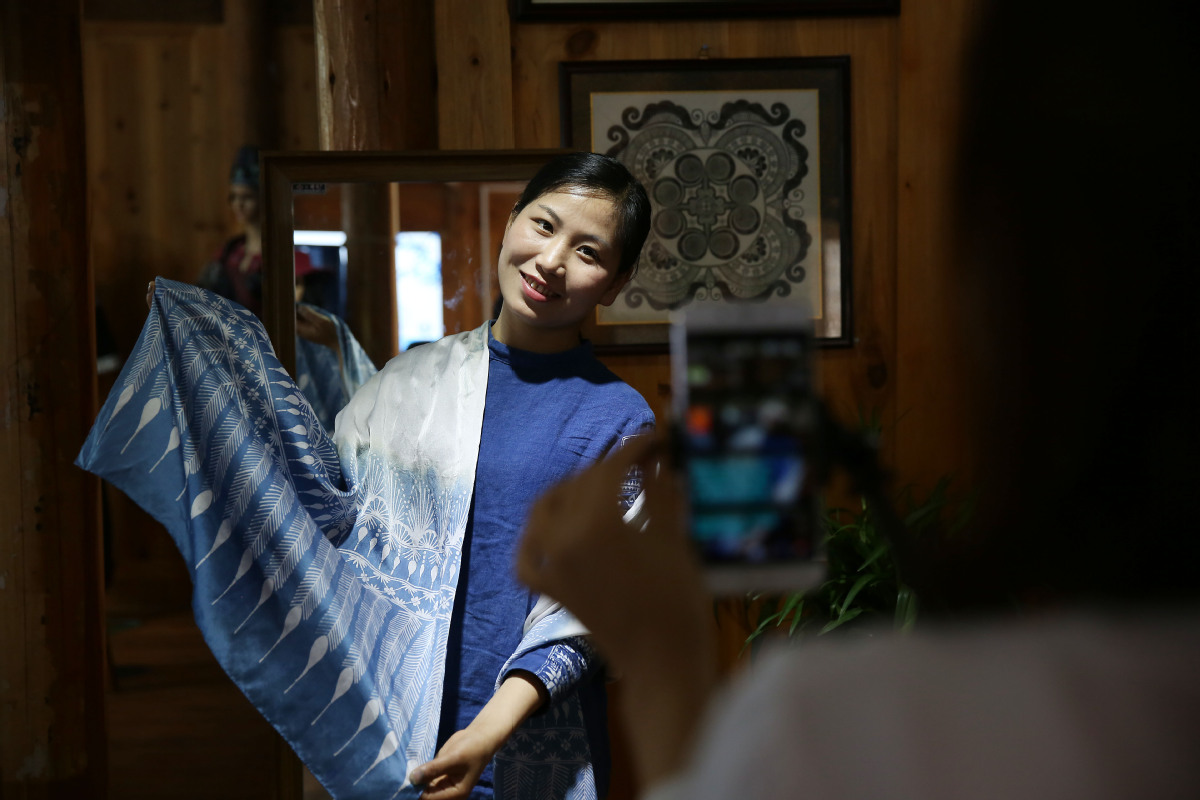Various localities in China take innovative measures to promote intangible cultural heritages
Starting in July, the Intangible Cultural Heritage Department of the Ministry of Culture and Tourism of China will support Guizhou Province in southwest China, as well as Shanghai city and Zhejiang Province in east China, to carry out a pilot program on promoting the high-quality inheritance and development of traditional crafts. What measures have these localities taken and how will they continue to explore innovative ways to carry forward their intangible cultural heritage projects? Let’s take a look.

Zhang Yiping shows her product via mobile livestreaming platform in Danzhai county, Guizhou province, May 2, 2018. (Photo/Xinhua)
Zhang Yiping, now 29 years old, is an inheritor of the art of wax printing in Danzhai county, Guizhou. While carrying forward the traditional craft herself, the woman has also invited other locals to join in her efforts to inherit and pass on the craft, which has helped to increase all of their incomes.
In 2014, Zhang, who was working outside Guizhou Province at the time, received a phone call from her mother, who asked her whether she wanted to return home to run a wax printing cooperative, which was going to be established with assistance from the government. The cooperative was founded later that same year and Zhang became its head, with more than 20 women joining the program at the beginning.
In 2015, Zhang rented out a 30-square-meter store and used it to sell wax printing products made by women from the cooperative. “Considering that our business was at an initial stage, the government granted us a low-interest loan of 50,000 yuan (about $7,410). I was in charge of the sales channels while the products were produced at the cooperative. Through such collaboration, we managed to run the business well,” said Zhang. She also combined the wax printing techniques with modern clothing culture, which enriched the categories of products on offer and resulted in more appealing products.
In 2016, Zhang founded her own company. In order to help more women in the locality, she encouraged them to join the cooperative or her company so that they could make more money. “The government also funded and organized training sessions for local women in an effort to involve more people in the business,” said Zhang.
Nowadays, more than 200 people in the locality have thickened their pockets by engaging in wax printing. Meanwhile, Zhang’s company has continued to develop steadily, being able to realize an annual sales volume of over 1 million yuan and selling some of its products to overseas markets.
On July 1, an intangible cultural heritage village, which was funded by the local government, was put into operation. By providing such services as experience tours and study tours, the village has delivered new opportunities for the development of the local wax printing industry in Danzhai county.
“There are eight national-level, 22 provincial-level, and 34 prefecture-level intangible cultural heritage projects in Danzhai. By introducing these projects to the intangible cultural heritage village, we expect to see them thrive together,” said Wei Shiyong, who is in charge of matters related to intangible cultural heritage in Danzhai county.
In September 2022, an ink making workshop is scheduled to be completed in Shanghai. By the time when the workshop is opened to the public, it will provide a space for citizens to learn about and experience the traditional craft of ink making in an immersive manner.
To bring such glamorous traditional crafts closer to people living in contemporary times in comparatively more interesting and diverse ways will be the focus of Shanghai in its endeavors to protect traditional crafts. Shanghai, located at the estuary of the Yangtze River and facing the Pacific Ocean, serves as a “cultural wharf” in the country, while being a major platform for traditional Chinese crafts to communicate and integrate with each other, as well as with their international counterparts.
Since 2015, Zhang Lili, a professor from the Shanghai Academy of Fine Arts, Shanghai University, who is also deputy dean of the Shanghai Art and Design Academy, started to devote herself to a national study and training program involving inheritors of intangible cultural heritage projects from across the country.
Over the past several years, over 90 study and training sessions have been held by universities and colleges in Shanghai, involving more than 3,000 cultural inheritors from across the country.
The study and training program held by Shanghai University alone has seen the participation of cultural inheritors of nearly 30 ethnic groups in the country. “The traditional crafts have thrived in the soil of inclusivity here in Shanghai,” said Zhang, while adding that they’ve promoted cooperation between domestic cultural inheritors and international designers, who have jointly produced multiple works of art that cater to the aesthetics of a modern lifestyle.
At a tea workshop in Jingshan village, Yuhang district, east China’s Hangzhou city, several international guests were experiencing tea making with tea whisks under the guidance of Chen Jinxin, a craftsman skilled in the local tea culture.
There are many such workshops in Jingshan village. They’ve held multiple activities to spread the local tea culture, including drying tea leaves, tasting tea, and making tea products.
The Jingshan tea ceremony in Jingshan village is a national-level intangible cultural heritage in China. The village is also home to other intangible cultural heritage projects associated with tea culture.
With assistance from the cultural and tourism department of Zhejiang Province, an intangible cultural heritage workstation was built in Yuhang district in December 2021, with Jingshan tea as its calling card.
Besides, there is also a tea culture experience center located in Jingshan village, in addition to a tea culture learning and communication center, a digital experience center, and a livestream room for promoting intangible cultural heritage items.
Chen said he plans to open an online store and roll out tea and whisking products so that more people can experience the traditional craft. Although the products haven’t been launched, several companies have already contacted Chen and expressed their hope for cooperation.
At present, Zhejiang Province has established 20 provincial-level workstations for traditional crafts and 98 provincial-level intangible cultural heritage workshops.
Photos
Related Stories
- Exhibition of Tibetan intangible cultural heritages held in Lhasa
- Intangible cultural heritages in NE China
- Sama Festival celebrated in SW China (5)
- Sama Festival celebrated in SW China (4)
- Sama Festival celebrated in SW China (3)
- Sama Festival celebrated in SW China (2)
- Sama Festival celebrated in SW China
- China's intangible cultural heritages exhibit in Anhui [Video]
- Tibet defines 21 intangible cultural heritages
- Folk beliefs deliberated on as cultural heritage: official
Copyright © 2022 People's Daily Online. All Rights Reserved.









